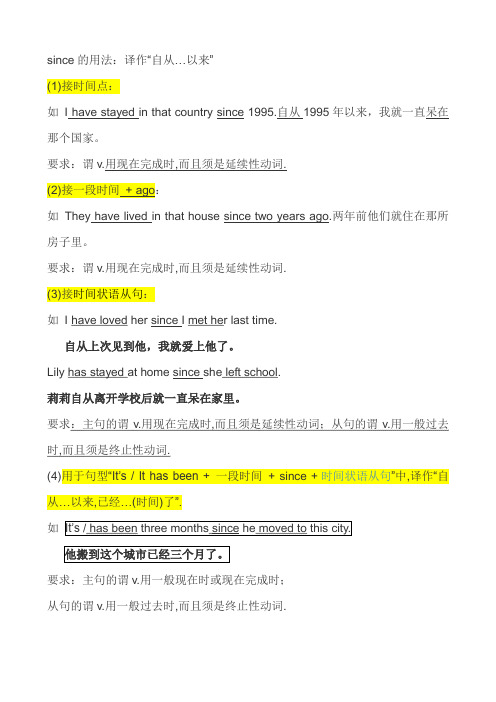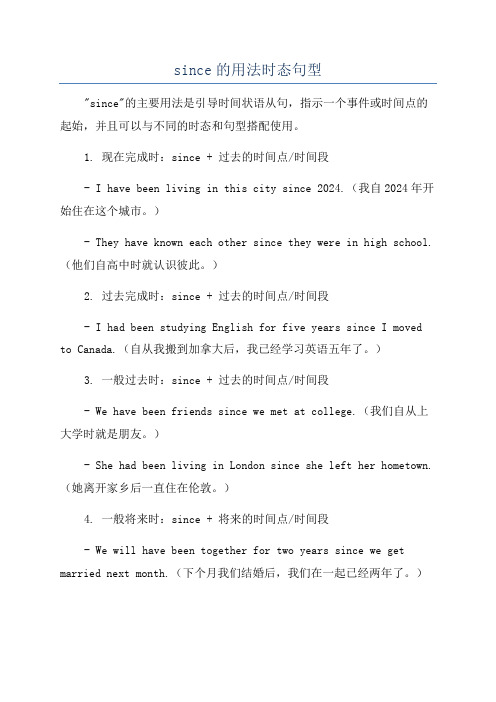现在完成时since & for ppt课件
初二英语现在完成时 since、for 用法单选题 30 题

初二英语现在完成时since、for 用法单选题30 题1. My sister has studied English ______ five years.A. sinceB. forC. inD. at答案:B。
解析:for后面接一段时间,表示动作持续了多久,这里说姐姐学英语持续了五年,所以用for。
since后面接时间点,如since 2010,这里不是时间点,所以A错误。
in和at不能用于现在完成时表示动作持续的时间,C和D错误。
2. Tom has lived in this city ______ he was born.A. forB. sinceC. whenD. as答案:B。
解析:since后面接时间点,表示自从某个时间点开始,这里说自从他出生就住在这个城市,是时间点,所以用since。
for后面接一段时间,这里不是一段时间,A错误。
when和as没有这种用于现在完成时表示从某个时间开始的用法,C和D错误。
3. They have been friends ______ three months ago.A. sinceB. forC. fromD. after答案:A。
解析:since后面接时间点,three months ago是一个时间点,表示自从三个月前他们就是朋友了。
for后面接一段时间,这里不是一段时间,B错误。
from没有这种用于现在完成时表示从某个时间开始的用法,C错误。
after表示在之后,不符合句子语境,D错误。
4. We have known each other ______ a long time.A. sinceB. forC. inD. during答案:B。
解析:for后面接一段时间,a long time是一段时间,表示我们认识彼此很长时间了。
since后面接时间点,这里不是时间点,A错误。
in和during不能用于现在完成时表示动作持续的时间,C和D错误。
现在完成时中的since与for

现在完成时中的since与forSince 用来说明动作起始时间,for用来说明动作延续时间长度。
I have lived here for more than twenty years.I have lived here since I was born..My aunt has worked in a clinic since 1949.Some new oilfields have been opened up since 1976.I have known Xiao Li since she was a little girl.My brother has been in the Youth League for two years.I have not heard from my uncle for a long time.注意:并非有for 作为时间状语的句子都用现在完成时。
I worked here for more than twenty years.(我现在已不在这里工作。
)I have worked here for many years.(现在我仍在这里工作。
)小窍门:当现在完成时+一段时间,这一结构中,我们用下面的公式转化,很容易就能排除非延续动词在完成时中的误使。
1)(对) Tom has studied Russian for three years.= Tom began to study Russian three years ago, and is still studying it now.2)(错) Harry has got married for six years.= Harry began to get married six years ago, and is still getting married now.显然,第二句不对,它应改为 Harry got married six years ago.或 Harry has been married for six years.。
since是什么时态标志词

since是什么时态标志词since代表的是过去那个时候发生的事对现在有影响,是现在完成时态的标志。
since作副词有“从此;此后;后来;之后”的意思;作连词有“自从……以来;自从……以后;自……以后;在……之后;因为;既然”的意思;作介词有“自从;在……之后;自……后”的意思。
扩展资料since的用法1.since作为介词,后接某一确定的时间点,主句谓语动词是持续性动词,常与现在完成时态、现在完成进行时态或过去完成时态连用。
例如:He left the village in 1982 and I haven’t seen him since then.1982年他离开这个村子,从那以后我再没见过他。
2.since作为副词,表示从过去以来、以后或到现在的情形或状态,常与现在完成时态连用。
例如:He left home two weeks ago and we haven’t heard from him since.他两周前离开了家,到现在我们一直没有他的`消息。
3.接时间点(谓语动词用现在完成时,而且须是延续性动词。
)例如:I have stayed in that country since 1995.自从1995年以来我一直呆在那个国家。
4.接一段时间+ago(谓语动词用现在完成时,而且须是延续性动词。
)例如:They have lived in that house since two years ago.他们两年前就住在那所房子里了。
5.接时间状语从句(主句的谓语动词用现在完成时,而且须是延续性动词;从句的谓语动词用一般过去时,而且须是终止性动词。
) 例如:(1)I have loved her since I met her last time.自从我上次见到她以来,我就一直爱着她。
(2)Lily has stayed at home since she left school.莉莉自从离开学校就一直呆在家里。
since的用法

since的用法:译作“自从…以来”
(1)接时间点:
那个国家。
(2)接一段时间+ ago:
房子里。
要求:谓v.用现在完成时,而且须是延续性动词.
(3)接时间状语从句:
自从上次见到他,我就爱上他了。
莉莉自从离开学校后就一直呆在家里。
(4)用于句型“It’s / It has been + 一段时间+ since + 时间状语从句”中,译作“自从…以来,已经…(时间)了”.
要求:主句的谓v.用一般现在时或现在完成时;
从句的谓v.用一般过去时,而且须是终止性动词.
(5)用于句型“一段时间+ has passed since + 时间状语从句”中,译作“自从…以来,…
(时间)已经过去了”.
要求:主句的谓v.用现在完成时,而且动词必须是has passed;从句的谓v.用一般过去时,而且须是终止性动词.
(6)注:当since用于否定句时,主句的谓v.可以是终止性动词.
(7)相关词组:“从那时起”:ever since、since then、from then on.
注:ever since作为一个词组,放句尾可单独使用.
另外,还可在since后接句子.since前加ever,只是加重语气而已.
害以来,我就戒烟了。
如Since he was lazy,he didn’t finish his homework.
由于他懒惰,他没有完成作业。
现在完成时Since和for的用法

现在完成时Since和for的用法Since 和for 的用法表示过去已经开始持续到现在的动作或状态常用的时间状语有:for, since, how long, so far, t hese days等。
Since+过去点的时间,for+一段时间(数词+量词),此划线部分用how long提问。
一、since短语或从句表示过去的动作延续至今,since之后的时间为一点。
如:Mr. Smith has worked here since 1984. 1984年以来,史密斯先生一直在这工作。
He’s learned about 5,000 English words since he went to college. 他上大学以来大约学了五千个英语单词。
二、for短语表示动作延续多长时间,for的宾语为时间段。
如:We have known each other for twenty years. 我们认识有二十年了。
I haven’t seen her for a long time. 我好久没有见到她了。
练习:用since和for填空1) ______ two years 2) _______ two years ago 3) _______ last month4) ______ 1999 5) _______ yesterday 6) _______ 4 o’clock7) ______ 4 hours 8) _______ an hour ago9) _______ we were children 10) _____ lunch time 11) ______ she left here1. He has lived in Nanjing ________ the year before last.2. I’ve known him __________ we were children.3. Our teacher has studied Japanese _________ three years.4. She has been away from the city ___________ ab out ten years.5. It’s about ten years __________ she left the city.2.短暂性转换延续性①arrive at/in sw. get to/reach sw. come/go/move to sw.→ be in sw./at school/at home/on the farm/be here/be there1) He got to Beijing five minutes ago. He ________ _________ _________ Beijing for _________ _________.2) I moved to the USA last year. I ________ ________ __________ the USA since __________ __________.3) I went home yesterday. I _______ ________ _________ home for _________ __________.4) They came here last week. They _________ _________ here since _________ __________.②come/go back, return → be back come/go out → be out1) He came out two years ago. He _________ __________ _________ for __________ __________.2) We return to Fuzhou yesterday. We ________ ________ _________ to Fuzhou since __________.③become → be1) I became a teacher in 2000. I ________ __________ a teacher for _________ _________.2) The river became dirty last year. The river _________ _________ dirty for _________ __________.④close → be closed open → be open1) The shop closed two hours ago.The shop ________ _________ _________ for _________ _________.2) The door opened at six in the morning. The door ________ ________ ________ for six hours.⑤get up → be up die → be dead leave sw. → be away from sw.fall asleep/get tot sleep → be asleep finish/end → be over marry → be married1) I got up two hours ago. I ________ ________ ________ since ________ ________.2) He left Fuzhou just now. He _______ ________ ________ _________ Fuzhou for five minutes.3) My grandpa died in 2002. My grandpa _______ _______ ________for _______ ________.4) The meeting finished at six. The meeting ________ ______ ______ for six hours.5) I got to sleep two hours ago. I ________ _________ _________ since _________ __________.6) They married in 1990. They ________ _________ __________since _________.⑥start/begin to do sth. → do sth. begin → be on1) I began to teach at this school in 1995.I ____ ____ at this school since ____.2) The film began two minutes ago. The film ____ ____ ____ for ____ ____.⑦borrow → keep lose → not have buy → have put on → w earcatch/get a cold → have a cold get to know → know1) They borrowed it last week. They _________ _________ it since __________ __________.2) I bought a pen two hours ago.I _________ _________ a pen for ________ __________.3) I got to know him last year. I _________ __________ him since __________ __________.4) I put on my glasses three years ago.I __________ __________ my glasses for _________ _________.⑧have/has gone to → have been in1) He has gone to Beijing. He ____ ____ _____ Beijing for two days.⑨join the league/the Party/the army→ be a league/a Party member/a soldier→ be a member of the league/the Party→ be in the league/the Party/the army1) He joined the league in 2002.He ________ _________ a _________ _________ for two years.He ________ __________ a __________ ___________ the __________ for two years. He ____________ ___________ ___________ the league for two years.2) My brother joined the army two years ago.My brother __________ __________ a ___________ for ___________ ___________. My brother ___________ ___________ in ____________ ___________ for two years.3.汉译英1)这本字典我已买了三年了。
since的用法时态句型

since的用法时态句型"since"的主要用法是引导时间状语从句,指示一个事件或时间点的起始,并且可以与不同的时态和句型搭配使用。
1. 现在完成时:since + 过去的时间点/时间段- I have been living in this city since 2024.(我自2024年开始住在这个城市。
)- They have known each other since they were in high school.(他们自高中时就认识彼此。
)2. 过去完成时:since + 过去的时间点/时间段- I had been studying English for five years since I moved to Canada.(自从我搬到加拿大后,我已经学习英语五年了。
)3. 一般过去时:since + 过去的时间点/时间段- We have been friends since we met at college.(我们自从上大学时就是朋友。
)- She had been living in London since she left her hometown.(她离开家乡后一直住在伦敦。
)4. 一般将来时:since + 将来的时间点/时间段- We will have been together for two years since we get married next month.(下个月我们结婚后,我们在一起已经两年了。
)需要注意的是,"since"引导的时间状语从句中的动词通常采用过去时,但如果主句中的动词本身已经表示了过去的内容,则从句中的动词可以使用现在完成时或过去完成时。
since主句和从句时态
since主句和从句时态
since引导时间状语从句,主语现在完成时,从句一般过去时。
1、since引导时间状语从句时,从句动词通常用一般过去时,主句动词用现在完成时。
since引导原因状语从句对时态没有特殊要求。
Since作为介词,后接某一确定的时间点,主句谓语动词是持续性动词,常与现在完成时态、现在完成进行时态或过去完成时态连用。
2、since后通常接一般过去时。
当since表示自从时,不管它是用作介词、连词还是副词,它通常都要与现在完成时连用。
当主句表示“多长时间”时,动词可用一般现在时,当主句谓语动词为seem等连系动词时是It seems like years since we last met。
3、since从句用延续性动词的现在完成时,则表示该动作或状态一直延续到现在时刻,而且可以包括现在时刻在内,时间的起点应从动作发生之时算起,句子的意思和动词的词意一致,具有肯定意味。
高考英语知识点:since从句的用法
高考英语知识点:since从句的用法1. Since从句为非延续性动词的过去时或现在完成时,时间的起点应该从从句动作完成时刻算起。
例如:Things have changed a lot since I wrote to you last time.自我上次给你写信之后,情况已发生了很大的变化。
She has lived with us since she has come here.自从她来到这里,就一直和我们住在一起。
2. Since从句为延续性动词的一般过去时,表示动作或状态的结束。
其含义与动词的词义恰好相反,具有否定意味。
例如:All has changed since he was at home.自从他离开家以后,这里的一切都变了。
I haven’t written to her since she lived in London.自从离开伦敦以来,我还没有给她写过信。
He has never been to see me since I was ill.自从我病愈以来,他一直没有来看我。
Two years have passed since I last smoked.我戒烟已经两年了。
但如果since从句是延续性动词的现在完成时,则表示动作由开始延续至说话的时候,具有肯定意味。
例如:He has never been to see me since I have been ill.自从我生病以来,他一直没有来看我。
She has talked little since she has stayed at home.自从她呆在家里以后,就很少讲话。
Since we have owned a car,we have gone camping every year.自从我们有了汽车后,年年都去野营。
3. 在现代英语中,since从句是延续性动词的一般过去时,有时候也可以表示肯定意味。
此时,多半用ever来加强since的语义。
since的用法总结整理
since的用法总结整理以下是我为大家整理的since的用法(总结),盼望可以关心到你们提高英语水平!since释义prep.从…以来; 自从…之后; 自从;adv.以后,此后; 后来; (距今几年)以前; (从那时候起几年)以前conj.自从…以来; 自从…的时候起; 既然; 由于since的用法一.Since作为介词后接某一确定的时间点,主句谓语动词是持续性动词,常与现在完成时态、现在完成进行时态或过去完成时态连用。
例如:1.He left the village in 1982 and I haven’t seen him since then.1982年他离开这个村子,从那以后我再没见过他。
2.She’s been working in a bank since leaving school.她中学(毕业)后就始终在一家银行工作。
3.He had spoken to her only once since the party. 自从那次聚会以来,他只跟她说过一次话。
二.Since作为副词表示从过去以来、以后或到现在的情形或状态,常与现在完成时态连用。
例如:1.He left home two weeks ago and we haven’t heard from him since. 他两周前离开了家,到现在我们始终没有他的消息。
2.He came to Zhenjiang 6 years ago and has lived here (ever) since.他6年前来到镇江,从今便住在这里。
三.since引导缘由状语从句作为连词,since可引导缘由状语从句,表示由于;既然;鉴于:例如:1.He didn’t come since he was busy.他由于忙,所以没有来。
2.Since this method doesn’t work,let’s try anoter.既然这种(方法)不行,我们就试用另一种吧。
since(自从)通常连用什么时态
since(自从)通常连用什么时态 ■湖南龙楠 一、s ince通常通常搭配的时态 当s ince表示“自从”时,不管它是用作介词、连词还是副词,它通常都要与现在完成时连用。
如: I’ve worn glasses since my childhood. 我从小就戴眼镜。
The works have been closed since January. 一月份以来这些厂就关闭了。
He’s put on a lot of weight since he gave up smoking. 他戒烟后体重增加了许多。
Nothing has happened since. 从那以后未发生什么事。
She moved to London last May and has since got a job on a newspaper. 她去年五月到伦敦此后一直在报社工作。
有时连用现在完成进行时。
如: He has been working since noon. 他从中午就开始工作了。
二、s ince搭配时态的特殊情况 虽然s ince通常要与现在完成时连用,但在以下情况,它也可以连用除完成时态以外的其他时态: 1.当主句表示“多长时间”时,动词可用一般现在时(当然也可用现在完成时)。
如: It’s a long time since I met you last. 好久不见了。
It’s just a week since we arrived here. 我们到这里才一个星期。
It’s a long time since I met you last. 从上次见到你,已有很长时间了。
以上各句的i t is也可换成it has been,不过在口语或非正式文体中,用一般现在时的情形比较普遍。
2.当主句谓语动词为s eem等连系动词时。
如: It seems like years since we last met. 我们似乎几年未见面了。
- 1、下载文档前请自行甄别文档内容的完整性,平台不提供额外的编辑、内容补充、找答案等附加服务。
- 2、"仅部分预览"的文档,不可在线预览部分如存在完整性等问题,可反馈申请退款(可完整预览的文档不适用该条件!)。
- 3、如文档侵犯您的权益,请联系客服反馈,我们会尽快为您处理(人工客服工作时间:9:00-18:30)。
1. Miss Zeng ___ to work in No.8
Middle School in 2009.
A. begins
B. began
C. has begun
2. She ___ here for six years. A. has worked B. worked C. was working
A. closed B. has been closed C. has closed
11. Mary ___ Tom in 2000. They ___ for 14 years.
A.married; have been married
B.married; have married
C.marries; have been married
4. He___his home for ten years. A. has left B. was away from C. has been away from
5. He___a League member for three
years.
A. is
B. has been
C.has became
6. Lihua's brother has___for two
现在完成时(二)
1. for & since 的用法 2. 短暂性动词 & 延续性动词
1. 我们从2015年开始在这里学习。 We _b_e_g_a_n_ _t_o_ _s_tu__d_y_here in 2015. in + 过去时间点 (一过)
2. 我们已经在这里学习了一年半了。 We _h_a_v_e_ _s_tu_d_i_e_d_ here for one and a
husband___for more than five years.
A. has died, has died B. has died, dead
C. died, has been dead
3. I have___ this nice watch for two years.
A. had B. bought C. borrowed
Pair work: A: How long has he/she … ?
B: He/ She has … for/since….
half an hour 20 minutes
30 years
a quarter
half an hour
15 years
短暂性动词:动作瞬间完成 延续性动词:动作或状态延续一段时间
A. has been; came B. has been; has come C. was; came
9. The film ___ for five minutes.
A. began
B. has been on
C. has begun
10. You are too late. The shop ___ for many hours.
half years. for + 时间段 (现完)
3. 我们从一年s半in前ce已+经过在去这时里间学点习(。现完) We h__a_v_e _ss_tui_nd_ci_ee_d+_ h时e间re段 + ago
since 2015. since + 一过句子 since one and a half years ago. since we came here.
years. A. joined the army
B. been in the army C. became a soldier
7. He hasn't____from Guangzhou
ever since he left school
A.left
B.been away
C.been left
8. Betty ___ here for two hours. She ___ here at 8:00 this morning.
3. He has been deaf ___ 2002. A. in B. since C. during
用 for或 since填空 1. He has worked on the farm s_i_n_c_e_
last year. 2. I have stayed at home _f_o_r_ a day. 3. We have lived in GuiLin _s_i_n_c_e__
短暂性动词
延续性动词
短 borrow
keep
暂 buy
have
性 动
arrive/ come / go
be (in) here / there
பைடு நூலகம்
词 leave
和 延 续
begin finish / end
不 与 时
性 join
间
动 die
词
段 连
open
用
be away
be on
可 与
be over
1. 上周我从图书馆借了一本书。
I _b_o_r_ro__w_e_d_ a book from the library last week. 短暂性动词:
不能与时间段连用
2. 这本书我已经借了一周了。
I _h_a_v_e_ _k_e_p_t_ the book for a
week.
延续性动词:
与时间段连用
two years ago. 4. She has known this man _s_i_n_c_e_
she came here. 5. Has he taught English_s_i_n_c_e_1989? 6. She hasn’t been in China _f_o_r_two
months.
时
be a member of 间
段
be dead
连
be open (adj.) 用
close
be closed
marry
be married
1. —How long can I ____ this book?
—Two weeks
A.borrow B.keep
C.lend
2. Her father___in 1990 and her
